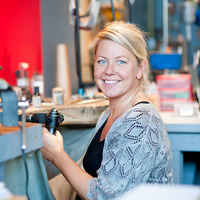How can we parents stimulate our kids creativity?
Found this wonderful article through PBS kids, read and be inspired --Mia
| Creativity and Play: Fostering Creativity |
Creativity is the freest form of self-expression and, for children, the creative process is more important than the finished product. There is nothing more fulfilling for children than to be able to express themselves freely. The ability to be creative can do much to nurture your children's emotional health. All children need to be creative is the freedom to commit themselves to the effort and make whatever activity they are doing their own. What's important to remember in any creative activity is the process of self-expression. Creative experiences help children express and cope with their feelings. Creativity also fosters mental growth in children by providing opportunities for trying out new ideas and new ways of thinking and problem solving. Creative activities help acknowledge and celebrate the uniqueness and diversity of your children as well as offer excellent opportunities to individualize your parenting and focus on each of your children. Opportunities for Creativity To fulfill your children's need for creativity and self-expression, be sure to provide activities that are based on their interests. Learn how to listen closely to what your children are saying. Offer your children a range of creative materials and experiences: drawing, painting, photography, music, trips to museums or zoos, and working with clay, paper, wood, water and more. Provide your children time to explore materials and pursue their ideas. Don't forget to give them time to talk these ideas over with other people, both adults and children. Varieties of Experience Look for ways to provide multi-ethnic, multi-cultural, and other community experiences for children. The more variety of experiences children have in their lives, the wider their range of creative expression. The more personal experiences your children have with people and situations outside of their own environment, the more material they can draw on to incorporate in their play. Creativity Traps Some parents and teachers have a hard time encouraging creative expression, even though they understand and appreciate its benefits. Maybe they don't feel creative themselves or are uncomfortable with the mess and materials. It's best to let your child tell you about their creation rather than guessing. Try not to judge, evaluate, or compare your children's creative expressions. A little assistance and direction can be helpful, but be careful not to interfere with your children's creative explorations. Fostering the Creative Process In order to foster the creative process, encourage your children to make their own choices. Give them frequent opportunities and lots of time to experience and explore expressive materials. What your children learn during the creative process is most important. Show your support for the creative process by appreciating and offering support for your children's efforts. Independence and control are important components in the creative process. This is especially true when working with children with disabilities. Creative Play One of the most important types of creative activity for children is creative play. Creative play is expressed when children use familiar materials in new or unusual ways, and when children engage in role playing and imaginative play. Nothing reinforces the creative spirit and nourishes a child's soul more than providing large blocks of time to engage in spontaneous, self-directed play throughout the day. But many parents misunderstand and underestimate the value of play in the lives of children, forgetting that play fosters physical, mental, and social development. Play also helps children express and cope with their feelings. Play helps develop each child's unique perspective and individual style of creative expression. In addition, play provides an excellent opportunity for integrating and including children with disabilities. Avoid dominating the play. Play should be the result of the children's ideas and not directed by the adult. Try to foster your children's abilities to express themselves through play. Try to help your children base play on their own inspirations, not yours. Your goal is to stimulate play and encourage children's satisfaction in playing with each other or by themselves. Pay attention to play, plan for it, encourage it. Learn how to extend children's play through your comments and questions. Try to stimulate creative ideas by encouraging children to come up with new and unusual uses of equipment. Try to remain open to new and original ideas and encourage children to come up with more than one solution or answer. Avoid toys and activities that spell everything out for your children and leave nothing to the imagination. http://www.pbs.org/wholechild/parents/play.html |







